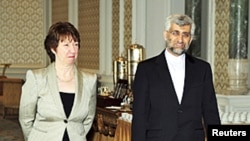U.S. representatives, along with their partners in the P5+1 group –- Britain, China, France, Russia, Germany and the EU -- met recently in Istanbul with Iranian diplomats. The purpose of the meeting, according to the P5+1, was to launch a practical process that would address core issues concerning Iran’s nuclear program. The discussions, however, ended without an agreement.
U.S. National Security Council spokesman Mike Hammer called the talks "disappointing"; Iran, he said, came to the meeting "unwilling to engage:"
"They set certain preconditions which were unacceptable. And what they saw in Istanbul is a P5 +1 that is unified and made very clear that it is Iran that needs to take the necessary steps to address the concerns of the international community. It is Iran that needs to demonstrate the peaceful purposes of its nuclear energy program, something that Iran has been unable to do. And it is Iran that is the only country that's an NPT [Nuclear Nonproliferation Treaty] signatory that seems unable to cooperate with the IAEA and live by its international obligations."
Mr. Hammer noted that the P5+1 presented some proposals in Istanbul that would allow Iran to start building confidence about its nuclear program, but that so far, Iran has not chosen to engage on them. One, he said, involved an update to the Tehran Research Reactor, or TRR, proposal from 2009, when Iran was offered fuel rods for the TRR and, in exchange, Iran would ship the bulk of its supply of low enriched uranium out of the country for further enrichment and processing. "It is fair to say," Mr. Hammer said, "that we in the P5+1 have been willing to put forward ideas, which, if Iran is prepared to undertake ... can lead to a path forward that addresses the international community's concerns."
Mr. Hammer further noted that the P5+1 has been pursuing a dual-track policy in regard to Iran: "one of diplomacy –- the door is open and remains open – or one of pressure." And in light of Iran's continued failure to address the legitimate concerns of the international community, the pressure, he said, will continue to mount. "Iran is further isolated today and will continue to be isolated," said Mr. Hammer. "So we will continue on this dual-track approach, hoping that Iran changes its calculus and realizes that the best path forward is, in fact, to engage in diplomacy."
NSC Spokesman Hammer On Iran

U.S. National Security Council spokesman Mike Hammer called the talks "disappointing"; Iran, he said, came to the meeting "unwilling to engage."



